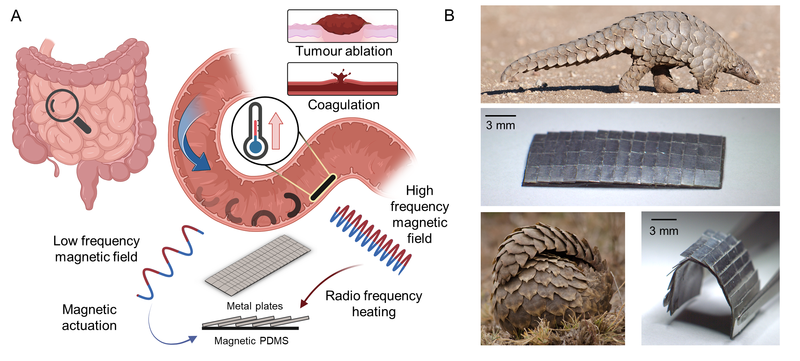Researchers at Stuttgart’s Max Planck Institute for Intelligent Systems have created a magnetically controlled soft medical robot with a distinctive, flexible shape inspired by a pangolin’s body.

The figure shows the pangolin-inspired untethered magnetic robot. A Conceptual illustration of the pangolin-inspired robot operating in the small intestine. The robot is actuated with a low-frequency magnetic field and heated remotely with a high-frequency magnetic field. The pangolin’s body consists of individual overlapping hard keratin scales. The robot inspired by this overlapping design is shown on the right. Images of pangolins used under a Standard license from Shutterstock
Despite the presence of hard metal components, the robot can move freely. Relying on the magnetic field, it may modify its shape to move and produce heat as necessary, enabling functions such as selective cargo transportation and release, as well as bleeding mitigation. On June 20th, 2023, the study was published in Nature Communications.
Pangolins are captivating creatures. This animal looks similar to a walking pine cone, as it is the only mammal that is covered entirely with hard scales.
The scales are composed of keratin, similar to the nails and hair. The scales overlap and are instantly linked to the underlying soft skin layer. This unique arrangement enables the animals to curl up into a ball in the event of danger.
While pangolins have several other special features, scientists from the Physical Intelligence Department at the Max Planck Institute for Intelligent Systems in Stuttgart, which is headed by Professor Dr. Metin Sitti, were specifically spellbound by how pangolins could curl up their scale-covered bodies in a flash.
They considered the animal as a model and came up with an adaptable robot made of soft and hard components that, just like the animal, turn into a sphere in the blink of an eyw. They also have an extra feature that the robot can emit heat when required.
In a new study performed, the first author of the study Ren Hao Soon and his collaborators present a robot design that is no more than two cm long and comprises two layers: a hard component made of metal elements and a soft layer made of a polymer studded with small magnetic particles arranged in overlapping layers. Hence, although the robot is made of solid metal components, it is soft and flexible for use within the human body.
The study was reported in the journal Nature Communications on June 20th, 2023.
When the robot has been exposed to a low-frequency magnetic field, the scientists could roll up the robot and move it back and forth as they prefer it to be. The metal elements bend, like the animal’s scales, without causing any harm to the surrounding tissue.
As soon as it is rolled up, the robot can transport particles like medicines. Researchers are of the notion that such a small machine will one day travel through the digestive system, for instance.
Double Useful: Freely Movable and Hot
When the robot is exposed to a high-frequency magnetic field, it heats up to more than 70 °C as a result of the built-in metal. Thermal energy has been utilized in numerous medical procedures, like treating thrombosis, stopping bleeding, and removing tumor tissue.
Untethered robots that have the potential to move freely, although they are made of hard elements like metal and could also emit heat, are unusual.
Hence, for modern medicine, the pangolin robot is considered promising. It could one day reach even the highly sensitive and narrowest regions in the body in a minimally invasive and gentle approach and emit heat as required: a vision of the future.
Journal Reference
Soon, R. H., et al. (2023) Pangolin-inspired untethered magnetic robot for on-demand biomedical heating applications. Nature Communications. doi.org/10.1038/s41467-023-38689-x.